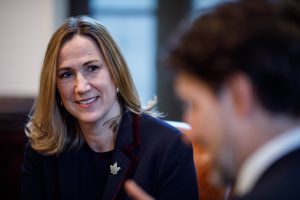Iron Negotiator, Velvet Glove: Our Woman in Washington
Kirsten Hillman, Canada’s first female ambassador to the United States, has a reputation for being nice and tough.

PMO, Twitter
Sen. Peter Boehm
March 27, 2020
As a former career foreign service officer — including postings at the Organization of American States and as Minister of Political and Public Affairs at our embassy in Washington — I was delighted to learn of Kirsten Hillman’s appointment as Canada’s Ambassador to the United States of America. When Ambassador Hillman finishes her assignment, hers will be the first portrait of a woman ambassador on the wall on the top floor of our beautiful embassy on Pennsylvania Avenue.
Not only has Kirsten Hillman smashed the gender glass ceiling, she has demonstrated that someone from a public service background can excel to achieve the jewel in the crown of Canada’s foreign service, and the one traditionally reserved for political appointees.
Ambassador Hillman, with whom I’ve worked and also have admired for several years, brings tremendous negotiating skills, a steely intellect and much humanity to her job. She was our Chief Negotiator for the Comprehensive and Progressive Agreement for Trans-Pacific Partnership Trade Agreement or CPTPP, a great deal for Canada. It was more than one Asia-Pacific negotiator whom I met in my own travels who told me how her open and friendly nature masked one of the toughest negotiators they had ever encountered. Trade policy has been her forte: as a negotiator, a trade lawyer and someone who — through a senior legal posting at the World Trade Organization in Geneva — understands the global trading system, its rules and regulations, intimately.
Do we need toughness in DC? Yes. Forthrightness? Absolutely. Friendliness? You bet, and especially now in the time of COVID-19, pressures on our border, the implementation of the new NAFTA (Hillman was key in the negotiations) and the forthcoming spectacle of the full-blown U.S. election campaign. An impressive network? She has it, from her past few assignments and also having served as Deputy Ambassador. Doing the ambassador’s job well requires an ability to understand the depths of what is happening within the DC Beltway, as well as to feel the political pulse back home through a symbiotic connection to the prime minister, his cabinet and the premiers. The bilateral relationship is, after all, “intermestic”. It’s also important for the ambassador to be the face of Canada in the U.S., dealing with a 24/7 American media that doesn’t necessarily harbour a great knowledge of our country and a Canadian media that reacts mightily to every nuance in our relationship with the Americans.
Ambassador Hillman’s savvy reading of “the Hill” and the Trump administration will be extremely important in assessing how forthcoming U.S. legislation impacts Canada, where we can offer partnership, where to find our Congressional allies and which issues will require some added work by our networks of consulates general and consulates throughout the U.S. Advising Ottawa on when and how to push back will be key. In effect, she will be the senior manager of our sometimes-all-consuming relationship with our closest ally, including in mutual defence, our shared environment and coordinating — where and when we can — positions in the multilateral clubs to which we both belong.
It is those clubs, after all, such as the UN, the G7 and G20, the international financial institutions, the WTO, regional organizations and others that provide the multilateral counterweight in our foreign policy to our often-overwhelming bilateral relationship with the United States. It won’t be easy — it never is — but the challenges for Canada presented by a preeminent neighbour who now often wishes to go it alone globally are greater than they have ever been.
Future steps in the COVID-19 crisis are uncertain. Canadian and U.S. approaches to dealing with the pandemic may diverge. The border deal struck to allow movement of goods and products in both directions while closely vetting and controlling human traffic was a necessary and positive step. But being a good neighbour at all times requires constant and forthright communication in both directions. This is where ambassadors are key. I served as Minister in our embassy in Washington under Ambassador Michael Kergin (the last civil servant to hold the position before Ambassador Hillman). The events of 9/11 and their aftermath tested us as never before in ensuring the clear flow of information, engaging American interlocutors at all levels, debunking conspiracy theories and very quickly working out a “smart border action plan” for that crisis. Much of this was done at the embassy in very close syncopation with Ottawa. The situation today is no less dire.
In Canadian practice, among our last several federal governments, the Washington relationship has strategically been handled through the prime minister and his office. This will continue to be the case, augmented by Deputy Prime Minister Chrystia Freeland in Ottawa and Ambassador Hillman managing the ground game in Washington. In many ways this is Kirsten Hillman’s time. She has the confidence of her prime minister and his government. She has worked with all the provincial premiers. She has served previous federal governments with distinction. She knows her files and has a vast network of contacts both in the U.S. government, in DC and across the country. She exhibits an open and polished media presence. A natural leader, she will urge what is best for Canada in these extremely uncertain times.
Senator Peter Boehm was Prime Minister Justin Trudeau’s Sherpa for the Charlevoix G7 Summit. He served as Ambassador to Germany from 2008 to 2012, Minister (political and public affairs) at the Canadian Embassy in Washington and as Ambassador to the Organization of American States.
